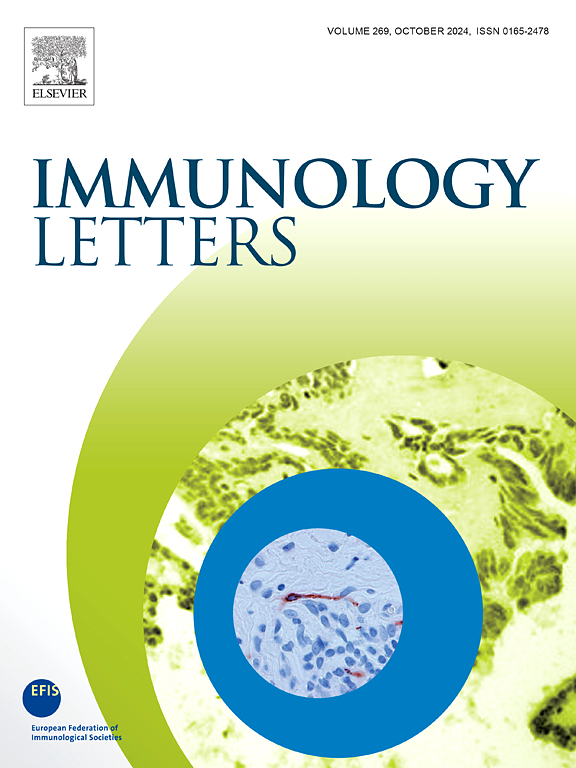Unveiling the hidden syndrome: The enigma of anti-transcobalamin receptor autoantibodies
IF 2.8
4区 医学
Q3 IMMUNOLOGY
引用次数: 0
Abstract
The transcobalamin receptor (CD320) functions as a critical mediator for vitamin B12 uptake in cells, with emerging evidence linking autoantibodies against CD320 to various autoimmune conditions. Pluvinage et al.'s recent study identified anti-CD320 autoantibodies as a cause of autoimmune vitamin B12 central deficiency, specifically affecting the central nervous system while sparing peripheral nerves. Their findings align with our previous work showing anti-CD320′s role in cutaneous arteritis. Both studies identified overlapping CD320 epitopes targeted by autoantibodies and demonstrated the therapeutic efficacy of high-dose vitamin B12 supplementation in mitigating symptoms. Expanding on these findings, we observed anti-CD320 autoantibodies in other inflammatory disorders such as systemic sclerosis, suggesting a broader clinical relevance. The work by Pluvinage et al. and our group supports the concept of an "anti-CD320-associated syndrome," with high-dose B12 supplementation as a promising treatment strategy. Further research is needed to fully elucidate the tissue-specific mechanisms and pathophysiology underlying these autoimmune conditions.
揭开隐藏的综合症:抗转钴胺素受体自身抗体之谜
转钴胺素受体(CD320)在细胞中作为维生素B12摄取的关键介质起作用,新的证据表明针对CD320的自身抗体与各种自身免疫性疾病有关。Pluvinage等人最近的研究发现,抗cd320自身抗体是自身免疫性维生素B12中枢缺乏症的一个原因,特别是影响中枢神经系统而不影响周围神经。他们的发现与我们之前的研究一致,表明抗cd320在皮肤动脉炎中的作用。两项研究都发现了重叠的CD320表位,这些表位被自身抗体靶向,并证明了高剂量维生素B12补充在缓解症状方面的治疗效果。在这些发现的基础上,我们在其他炎症性疾病(如系统性硬化症)中观察到抗cd320自身抗体,这表明其具有更广泛的临床相关性。Pluvinage等人和我们小组的工作支持“抗cd320相关综合征”的概念,将大剂量补充B12作为一种有希望的治疗策略。需要进一步的研究来充分阐明这些自身免疫性疾病的组织特异性机制和病理生理学。
本文章由计算机程序翻译,如有差异,请以英文原文为准。
求助全文
约1分钟内获得全文
求助全文
来源期刊

Immunology letters
医学-免疫学
CiteScore
7.60
自引率
0.00%
发文量
86
审稿时长
44 days
期刊介绍:
Immunology Letters provides a vehicle for the speedy publication of experimental papers, (mini)Reviews and Letters to the Editor addressing all aspects of molecular and cellular immunology. The essential criteria for publication will be clarity, experimental soundness and novelty. Results contradictory to current accepted thinking or ideas divergent from actual dogmas will be considered for publication provided that they are based on solid experimental findings.
Preference will be given to papers of immediate importance to other investigators, either by their experimental data, new ideas or new methodology. Scientific correspondence to the Editor-in-Chief related to the published papers may also be accepted provided that they are short and scientifically relevant to the papers mentioned, in order to provide a continuing forum for discussion.
 求助内容:
求助内容: 应助结果提醒方式:
应助结果提醒方式:


